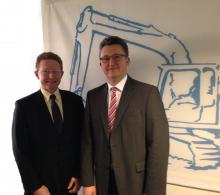
Engines for non-road mobile machinery (NRMM) will continue to be accepted into the UK through 2021 on the basis of existing valid European Union approvals.
This continued acceptance is part of the UK government’s recently revised BREXIT guidelines covering the placing of manufactured goods on the UK market after the current transition period ends on December 31 this year.
The EU and UK continue to negotiate for a free trade agreement. However, noted the Brussels-based CECE - Committee for European Construction Equipment - if an agreement is ratified it might supersede some of the new guidance.
The CECE’s technical commission, which has reviewed the UK government’s revised guidance, said that whether or not a free trade deal is struck, the Northern Ireland Protocol will come into force on January 1, 2021. At that moment the Northern Ireland market will generally being treated as if it were still in the EU Single Market.
“Therefore, from a goods regulatory perspective, once the current transition period ends, the UK market will effectively be split into the GB [Great Britain] market comprising England, Scotland and Wales versus the Northern Ireland market,” notes the commission.
One of the most noteworthy announcements in the recent guidance is that the UK has offered a grace period up to December 31, 2021. During this time, products that are currently CE marked and have either been self-assessed or assessed by an EU recognised notified body, can continue to be placed on the GB market.
This new guidance supersedes previous advice that indicated products would require to be “UKCA” marked, with any mandatory conformity assessments being performed by a UK-based notified body, by the much earlier date of January 1, 2021.” However, it should be noted that this grace period will end on January 1, 2022, meaning that products must be UKCA marked and fully compliant with all aspects of UK law thereafter,” notes the CECE.
Meanwhile, the CECE has moved its annual Congress online to be live-streamed from a TV studio in Stockholm, Sweden, on October 8.
During the 2020 event, there will be an analysis of a “post Covid-19 reality and its impact on the construction equipment sector”. Current regulatory challenges will be discussed and an economic update on the construction equipment markets will be presented. The innovation and latest trends in the industry in light of sustainability will be also discussed.
More information on the Congress and how to attend is available on the CECE website.
The CECE represents the interests of national construction equipment manufacturer associations in Europe. The sector has around 1,200 companies that employ about 300,000 people directly and indirectly.









